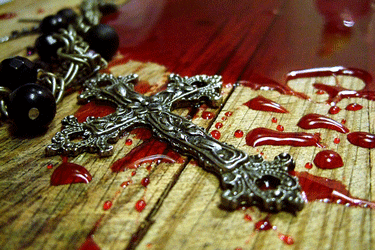Today is the Feast of St. Bonaventure, this Universal Doctor was one of the first saintly Cardinals of the Church. He is known as "The Seraphic Doctor."
In honour of today's Feast of St. Bonaventure, let us read his sermon on a theme of importance for the Sacred Heart of our Lord:
With you is the source of lifeTake thought now, redeemed man, and consider how great and worthy is he who hangs on the cross for you. His death brings the dead to life, but at his passing heaven and earth are plunged into mourning and hard rocks are split asunder.It was a divine decree that permitted one of the soldiers to open his sacred side with a lance. This was done so that the Church might be formed from the side of Christ as he slept the sleep of death on the cross, and so that the Scripture might be fulfilled: They shall look on him whom they pierced. The blood and water which poured out at that moment were the price of our salvation. Flowing from the secret abyss of our Lord’s heart as from a fountain, this stream gave the sacraments of the Church the power to confer the life of grace, while for those already living in Christ it became a spring of living water welling up to life everlasting.Arise, then, beloved of Christ! Imitate the dove that nests in a hole in the cliff, keeping watch at the entrance like the sparrow that finds a home. There like the turtledove hide your little ones, the fruit of your chaste love. Press your lips to the fountain, draw water from the wells of your Savior; for this is the spring flowing out of the middle of paradise, dividing into four rivers, inundating devout hearts, watering the whole earth and making it fertile.Run with eager desire to this source of life and light, all you who are vowed to God’s service. Come, whoever you may be, and cry out to him with all the strength of your heart. “O indescribable beauty of the most high God and purest radiance of eternal light! Life that gives all life, light that is the source of every other light, preserving in everlasting splendor the myriad flames that have shone before the throne of your divinity from the dawn of time! Eternal and inaccessible fountain, clear and sweet stream flowing from a hidden spring, unseen by mortal eye! None can fathom your depths nor survey your boundaries, none can measure your breadth, nothing can sully your purity. From you flows the river which gladdens the city of God and makes us cry out with joy and thanksgiving in hymns of praise to you, for we know by our own experience that with you is the source of life, and in your light we see light.
In the same spirit, we can read another sermon by the Seraphic Doctor:
The Lord was pleased to endorse and to confirm the teaching and Rule of St. Francis, not only by miraculous signs, but also by the marks of his own stigmata, so that no true believer could possibly question them on external or internal evidence. And in his goodness God was pleased to affix his own seal to the Rule and teaching of St. Francis, who would never have presumed to teach or write anything other than what he received from the Lord. As he himself testifies, it was God who revealed to him the entire Rule.
St. Bonaventure's Sermon of October 4th, 1255
Ss. Franics and Bonaventure, ora pro nobis!











